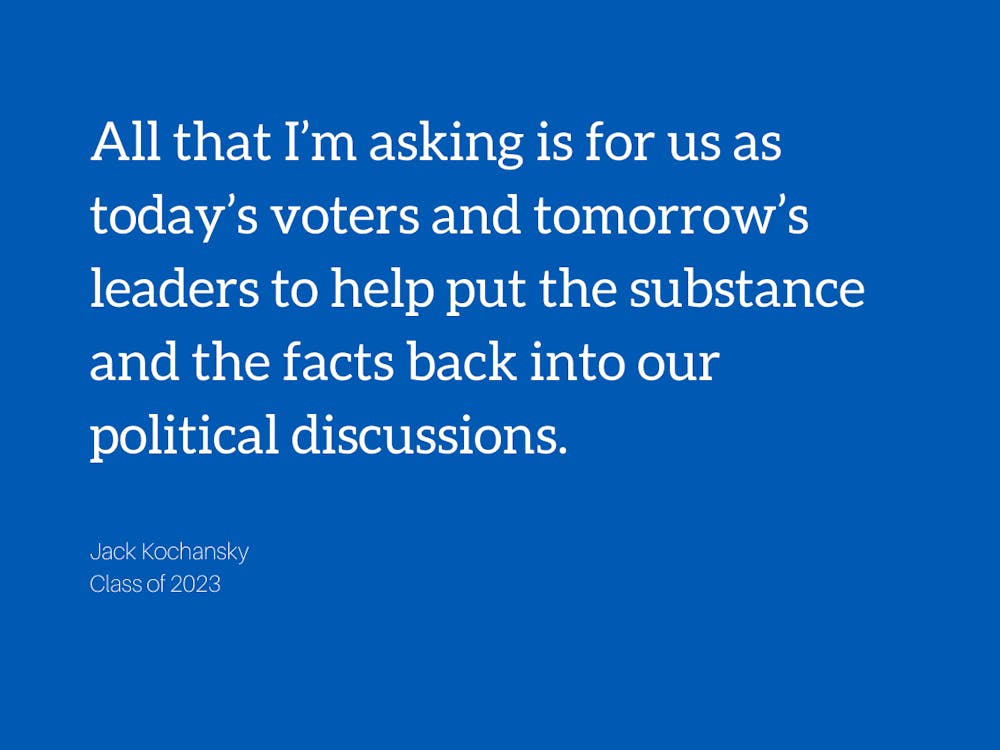Informing ourselves is an essential part of being an engaged citizen. But recognizing what we do not know is the most important step in getting informed.
Last week, I was texting with my friends about the coronavirus, and one of them sent a screenshot of an article. The author claimed that “a Stanford University hospital board member” discovered that drinking water at least once every fifteen minutes would decrease the risk of infection. According to the article, chugging water flushes viral particles into our stomachs, where the acidic environment kills any sort of pathogen. That sounds great and all—pretty scientific, even—except there’s just one problem: it isn’t true.
Meanwhile, after hearing the convincing endorsement of “a Stanford University hospital board member” and thinking about how this might work, I was convinced. In fact, I was such a believer that I told other friends and my family about it, urging them to chug water, too. A quick Google search revealed that reputable experts (including some from Stanford) have refuted those claims outright, and I was embarrassed to have believed the bogus medical advice at all. Fortunately, the only consequence of my misinformation was probably a few extra trips to the bathroom, but it could’ve been much worse. Drinking silver and bleach are also false cures to the coronavirus that circulated widely on social media, and believing them would’ve been far more dangerous.
I learned that I am gullible, but even worse, I realized that it didn’t take much for me to feel like enough of an expert to impose my “knowledge” upon those around me. We do this every day—even outside of times of crisis. Our beliefs are easily shaped by Facebook posts, talk show hosts and flashy news headlines. We’ll often adopt the talking points of public figures we support without really looking into the details.
Although fake medical advice regarding the coronavirus is more dangerous in the short-term than widespread misconceptions about climate or foreign policy, misinformation in these broader issues has long-term consequences. Public opinion shapes public policy, which in turn touches every aspect of life. For example, climate skepticism today will cost millions of lives down the line as we fail to mitigate global warming.
Why do we believe fake news? We tend to live in political bubbles, echo chambers where we hear what we want to hear and believe what we want to believe. I fell victim to that very fallacy. I wanted to believe that there was some easy way to avoid the coronavirus, so I did. In politics, the same principle holds true. Without too much effort, people with nearly any political viewpoint can find a media source that tells them what they want to hear. And when anyone else challenges our positions, we react immediately by finding a counterargument instead of listening.
So what can we do? Well, a good first step is getting comfortable saying, “I don’t know.” As Duke students—bright, young individuals comfortable being at the top of our classes—this is tough. But with all of our other responsibilities in life, we can’t possibly be experts on everything, and it’s time for us to build up the humility to accept that. Recognizing that we may be ignorant is the first step towards learning more.
All of this is not to say that we should disengage from politics. On the contrary, we can be more engaged and more impactful when we know what we’re talking about. Every person is entitled to their own informed opinion, but not to their own uninformed “facts.” Therefore, we should all educate ourselves more, trusting the experts and not being afraid to examine issues from many positions. Even something as simple as reading about controversial topics from a range of reputable news outlets can help us to understand our fellow citizens better, a key step towards making meaningful agreements.
We as Duke students are in the unique position of being able to make a real difference on this issue. North Carolina is a swing state, and as lawmakers look to maintain support, they listen closely to the voices of new voters like us. We are leaders and advocates, not only in Durham, but also as some of the brightest students in the country, and we can use that influence to inspire others and hold our lawmakers accountable. We are at Duke to learn, and the quest for truth is one of the central tenets of education.
I don’t care what your political ideology is. All that I’m asking is for us as today’s voters and tomorrow’s leaders to help put the substance and the facts back into our political discussions. There are real problems that Americans are facing today and will face in the future, and the current political system is not well equipped to fix them.
But in order to repair our national politics, we must first reassess what we think we know. It’s time for facts to drive our opinions, not the other way around.
Jack Kochansky is a Trinity first-year.
Get The Chronicle straight to your inbox
Sign up for our weekly newsletter. Cancel at any time.

